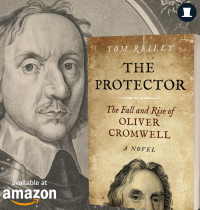
This is a dangerous book. If you have any investment in pursuing the truth, then what you will find within will be at times enlightening, and shocking. Mainstream, packaged history that is freshly sliced for America’s students in neatly compartmentalized boxes barely gives a whisper of the word “conspiracy,” as if it were a disease to avoid exposing to the innocent.
Yet as historians, our goal should always be to pursue the truth, no matter how uncomfortable the answers might be. Facts are stubborn things, as John Adams was fond of saying. History at its best should bend or break our preconceived notions of what a static historical record should consist of. Conspiracies are far more common than we imagine, and one should never have to apologize for proffering them as solutions to historical mysteries. Historians should not have to whisper the word for fear of academic reprisal.
For truly, what are conspiracies? Put simply, it is when a group of people plan to execute a specific task. Humans are social creatures. We work together to accomplish an endless number of ideas throughout the course of our lives. It is counterintuitive to think otherwise. It is time to move conspiracies from the realm of the paranormal to that of the normal.
Ironically though, there is nothing normal about the conspiracy to assassinate President John F. Kennedy. So much has been written about this  man’s death, now over half a century since that tragic day in Dallas. The astute reader might wonder what more could be added to what has already been exhaustively written. The
answer is two-fold.
man’s death, now over half a century since that tragic day in Dallas. The astute reader might wonder what more could be added to what has already been exhaustively written. The
answer is two-fold.
Much to the credit of many hardworking historians in the past five decades, Kennedy’s assassination has been examined from the standpoint of how it happened, and who was responsible. Very little time
has been spent trying to examine why he was killed, especially how a little known country in Southeast Asia named Laos hastened his demise.
I will argue in this book that the CIA’s secret drug trade in Laos, and the president’s effort to end it, provided the primary motive that the CIA needed to assassinate the president. A lot of effort
has made to examine the president’s Vietnam policy, which does link to this as we will see, but precious little attention has been paid to the opium trade in Laos that was making the CIA wealthy and
powerful beyond its wildest dreams. This book will chronicle the president’s secret war with the CIA over Laos, a high stakes game that cost him his life.
The second addition to the historical record that this book will contribute is an attempt to link the JFK assassination with the other three major assassinations of the 1960s: Malcolm X, Martin Luther King, and Robert F. Kennedy. Not enough attention has been paid to why these leaders were killed as well. We will see that all four of the assassinations are linked together, all funded and executed by the CIA to silence the four most vocal leaders who were opposed to the agency’s pro-war, and pro-drug policy in Laos and Vietnam.
Finally, we will examine the impact this has had on the course of history, and imagine a world where a part of the United States government never saw fit to overturn the will of the American people, and rob the nation of four of the most important leaders in U.S. history for its own power and financial gain.
 Why The CIA Killed JFK and Malcolm X - The Secret Drug Trade in
Laos
Why The CIA Killed JFK and Malcolm X - The Secret Drug Trade in
Laos
by John Koerner
This book breaks new ground in two important areas that have yet to be linked and explored by any JFK-assassination historian.
John Koerner argues that the CIA’s secret drug trade in Laos, and the president’s effort to end it, provided the primary motive that the CIA needed to assassinate the president. A lot of effort has been made to examine the president’s Vietnam policy, but precious little attention has been paid to the opium trade in Laos that was making the CIA wealthy and powerful beyond its wildest dreams. This book chronicles the president’s secret war with the CIA over Laos, a high-stakes game that cost him his life.
Koerner also links the JFK assassination and the drug trade with the other three major assassinations of the 1960s: Malcolm X, Martin Luther King, and Robert F. Kennedy. We will see that all four of the assassinations are linked together, all funded and executed by the CIA to silence the four most vocal leaders who were opposed to the agency’s pro-war and pro-drug policy in Laos and Vietnam.
Finally, Koerner examines the impact this has had on the course of history, and imagines a world where these men had lived.
- eBook £6.99 || $9.99
- Nov 28, 2014. 978-1-78279-700-5.
- BUY | AMAZON US | AMAZON UK
- Paperback £9.99 || $14.95
- Nov 28, 2014. 978-1-78279-701-2.
- BUY | AMAZON US | AMAZON UK
Categories:
0 comments on this article







